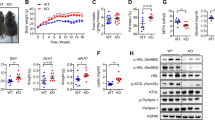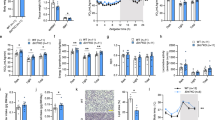Abstract
Objective:
Calorie restriction increases the life span in a number of different organisms. This effect is dependent upon activation of the Sirt1 enzyme, and many of the beneficial effects of calorie restriction can be mimicked using resveratrol, which activates the Sirt1 enzyme. Nothing is known about this system in human adipose tissue; therefore, we investigated this system in human adipose tissue.
Design:
Sirt1 mRNA was measured in adipose tissue biopsies from human volunteers before and after 6 days of total fasting. In addition, adipose tissue from lean and obese individuals was compared and in vitro investigations were performed.
Results:
Long-term total fasting (6 days) of nine human volunteers increased Sirt1 mRNA expression in subcutaneous adipose tissue more than twofold (0.197–0.454 arbitrary units, P<0.05). Likewise, lean women (n=12) had more than twofold higher Sirt1 expression in subcutaneous adipose tissue compared to obese women (n=12; 0.33–0.73 arbitrary units, P<0.05). Sirt1 was equally expressed in the stroma-vascular fraction and the isolated adipocyte fraction. Finally, in vitro, we demonstrated that resveratrol (a Sirt1 activator) significantly enhanced the lipolytic effect of epinephrine in human adipose tissue (P<0.05).
Conclusion:
Human adipose tissue contains Sirt1 and the expression of Sirt1 can be regulated by calorie restriction as in other species. Furthermore, we demonstrated that resveratrol affects human fat-cell metabolism similar to the effects in rodents (that is, increased epinephrine induced lipolysis). These findings indicated that the beneficial effects of calorie restriction in humans might involve the activation of Sirt1. Thus, based on these findings, we propose that Sirt1 might play important roles for the beneficial effects of calorie restriction in humans.
This is a preview of subscription content, access via your institution
Access options
Subscribe to this journal
Receive 12 print issues and online access
$259.00 per year
only $21.58 per issue
Buy this article
- Purchase on Springer Link
- Instant access to full article PDF
Prices may be subject to local taxes which are calculated during checkout




Similar content being viewed by others
References
McCay CM, Crowell MF, Maynard LA . The effect of retarded growth upon the length of the life span and upon the ultimate body size. J Nutr 10; 63–79: 1935. ref type: Journal (full).
Ingram DK, Anson RM, de CR, Mamczarz J, Zhu M, Mattison J et al. Development of calorie restriction mimetics as a prolongevity strategy. Ann N Y Acad Sci 2004; 1019: 412–423.
Lin SJ, Defossez PA, Guarente L . Requirement of NAD and SIR2 for life-span extension by calorie restriction in Saccharomyces cerevisiae. Science 2000; 289/5487: 2126–2128.
Picard F, Kurtev M, Chung N, Topark-Ngarm A, Senawong T, hado De OR et al. Sirt1 promotes fat mobilization in white adipocytes by repressing PPAR-gamma. Nature 2004; 429/6993: 771–776.
Howitz KT, Bitterman KJ, Cohen HY, Lamming DW, Lavu S, Wood JG et al. Small molecule activators of sirtuins extend Saccharomyces cerevisiae lifespan. Nature 2003; 425/6954: 191–196.
Cohen HY, Miller C, Bitterman KJ, Wall NR, Hekking B, Kessler B et al. Calorie restriction promotes mammalian cell survival by inducing the SIRT1 deacetylase. Science 2004; 305/5682: 390–392.
Baur JA, Pearson KJ, Price NL, Jamieson HA, Lerin C, Kalra A et al. Resveratrol improves health and survival of mice on a high-calorie diet. Nature 2006; 444/7117: 337–342.
Guarente L . Sirtuins as potential targets for metabolic syndrome. Nature 2006; 444/7121: 868–874.
Andersen PH, Kristensen K, Pedersen SB, Hjollund E, Schmitz O, Richelsen B . Effects of long-term total fasting and insulin on ob gene expression in obese patients. Eur J Endocrinol 1997; 137: 229–233.
Hauner H, Entenmann G, Wabitsch M, Gaillard D, Ailhaud G, Negrel R et al. Promoting effect of glucocorticoids on the differentiation of human adipocyte precursor cells cultured in a chemically defined medium. J Clin Invest 1989; 84/5: 1663–1670.
Bjorkhem I, Arner P, Thore A, Ostman J . Sensitive kinetic bioluminescent assay of glycerol release from human fat cells. J Lipid Res 1981; 22/7: 1142–1147.
Pedersen SB, Kristensen K, Hermann PA, Katzenellenbogen JA, Richelsen B . Estrogen controls lipolysis by upregulating alpha2A-adrenergic receptors directly in human adipose tissue through the estrogen receptor alpha. Implications for the female fat distribution. J Clin Endocrinol Metab 2004; 89/4: 1869–1878.
Dasgupta B, Milbrandt J . Resveratrol stimulates AMP kinase activity in neurons. Proc Natl Acad Sci USA 2007; 104: 7217–7222.
Fujii N, Jessen N, Goodyear LJ . AMP-activated protein kinase and the regulation of glucose transport. Am J Physiol Endocrinol Metab 2006; 291/5: E867–E877.
Qiao L, Shao J . SIRT1 regulates adiponectin gene expression through Foxo1-C/enhancer-binding protein alpha transcriptional complex. J Biol Chem 2006; 281/52: 39915–39924.
Acknowledgements
The expert technical assistance of Lenette Pedersen and Pia Hornbek is appreciated. The study was part of the DanORC consortium. DanOrc is supported by the Danish Council for Strategic Research. The study was supported by grants from the NovoNordisk Foundation, The Danish Medical Research Council and the Institute of Clinical Medicine, Aarhus University.
Author information
Authors and Affiliations
Corresponding author
Rights and permissions
About this article
Cite this article
Pedersen, S., Ølholm, J., Paulsen, S. et al. Low Sirt1 expression, which is upregulated by fasting, in human adipose tissue from obese women. Int J Obes 32, 1250–1255 (2008). https://doi.org/10.1038/ijo.2008.78
Received:
Revised:
Accepted:
Published:
Issue Date:
DOI: https://doi.org/10.1038/ijo.2008.78
Keywords
This article is cited by
-
Molecular mechanisms of dietary restriction promoting health and longevity
Nature Reviews Molecular Cell Biology (2022)
-
Bariatric surgery can acutely modulate ER-stress and inflammation on subcutaneous adipose tissue in non-diabetic patients with obesity
Diabetology & Metabolic Syndrome (2021)
-
Reduced SIRT1 and SIRT2 expression promotes adipogenesis of human visceral adipose stem cells and associates with accumulation of visceral fat in human obesity
International Journal of Obesity (2020)
-
Pharmacologic or genetic activation of SIRT1 attenuates the fat-induced decrease in beta-cell function in vivo
Nutrition & Diabetes (2019)
-
Adipose tissue, but not skeletal muscle, sirtuin 1 expression is decreased in obesity and related to insulin sensitivity
Endocrine (2018)



